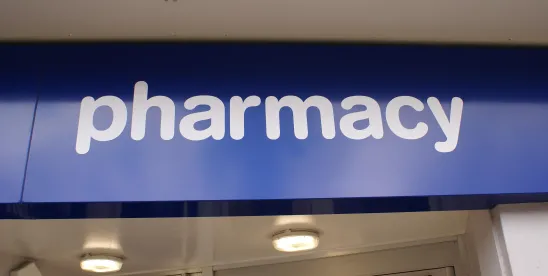On April 16, 2025, Arkansas Governor Sarah Huckabee Sanders signed into law House Bill 1150, now Act 624 (the Act), making Arkansas the first state in the nation to prohibit pharmacy benefit managers (PBMs) from acquiring or holding a direct or indirect interest in a pharmacy. The Act—which broadly prohibits PBM ownership in retail and mail-order pharmacies—moves forward a policy initiative that has stagnated at the federal level following the introduction of the Patients Before Monopolies (PBM) Act, and could provide a blueprint for other states to pass similar legislation.
Overview of the Act
Under the Act, as of January 1, 2026, the Arkansas State Board of Pharmacy (Board) must either revoke or not renew pharmacy permits where the permit holder is a PBM or its subsidiary, is an entity managed by a PBM, or is an entity that has a direct or indirect ownership interest in a PBM. The Act’s only exemption allows pharmacy employers and pharmacies to maintain a direct or indirect interest in a PBM if: (1) the pharmacy employer is the sole Arkansas client of such PBM; and (2) the pharmacy exclusively services the employees and dependents of the pharmacy employer while using the PBM in Arkansas.
Limited Use Permits. Until September 1, 2027, the Board may convert the pharmacy permit of a pharmacy owned by a PBM into a limited use permit, allowing such pharmacy to sell certain rare, orphan, or limited distribution drugs that otherwise would be unavailable in the market for a minimum of 90 days. Before January 1, 2026, the Board will issue a written policy outlining (i) how patients, pharmacies, or healthcare providers may notify the Board of a drug’s unavailability in the market; (ii) how pharmacies may request a limited use permit from the Board, (iii) timing for Board decisions; and (iv) a process for making emergency determinations due to patient needs.
Extensions or Renewals Pending Sale of Pharmacy to Eligible Buyer. For pharmacies subject to the Act, the Board has the discretion to extend the use, or issue a renewal, of a permit for a pharmacy that offers same-day patient access for pharmacist services, a prescription for a controlled substance, mental health services, or other critical patient healthcare services, provided that there is a pending sale of the pharmacy to an eligible buyer.
Critical Dates. Ninety days before January 1, 2026, the Board must provide written notice to any pharmacy permit holder that it believes is in violation of the Act. Pharmacies in receipt of such notice will not have long to react; any pharmacy in receipt of notice from the Board must provide written notice to each patient and each patient’s prescribing healthcare provider that has used the pharmacy within the previous year that, beginning in the new year, the pharmacy will no longer be able to dispense retail drugs to the patient. Such notice will only be deemed sufficient if it (1) is delivered 60 days prior to January 1, 2026; (2) is transmitted via mail, email or through the patient portal; (3) contains the Board’s phone number and email address; and (4) contains a list of Arkansas pharmacies holding an active pharmacy permit that are not in violation of the Act. Any pharmacy in violation of the Act that fails to meet the compliance requirements by January 1, 2026, will have its pharmacy permit revoked or not renewed.
Impact of the Act
Passage of the Act has already had immediate industry effects, with some of the nation’s largest PBMs either announcing plans to shutter their Arkansas pharmacy operations or publicly cautioning about potential disruptions to hundreds of thousands of Arkansians’ prescriptions. PBMs and other industry stakeholders have also criticized the Act’s potential to limit patients’ access to drugs, increase prescription drug spending in the state, cost jobs, and hurt local revenues. Despite these criticisms, other states—including Indiana, New York and Vermont—are considering passage of similar state initiatives to bolster independent pharmacies and combat what they perceive as anticompetitive operations.
At the federal level, the National Association of Attorneys General (NAAG), on behalf of a bipartisan coalition of 39 state and territory attorneys general, sent a letter to Speaker Mike Johnson, Minority Leader Hakeem Jeffries, and Senators John Thune and Chuck Schumer on April 14, 2025 urging Congress to pass legislation prohibiting PBMs from owning or operating pharmacies. Although not specifically mentioned in the NAAG’s letter, the Patients Before Monopolies (PBM) Act, introduced in December 2024 by Senators Elizabeth Warren (D-MA) and Josh Hawley (R-MO), would meet the NAAG’s requests by (i) prohibiting a parent company of a PBM or a health insurer from owning a pharmacy business, and (ii) requiring that a parent company in violation of the PBM Act divest its pharmacy business within three years.
The passage of a federal-level initiative or proliferation of state-level initiatives similar to Act 624 may destabilize the PBM and pharmacy markets and result in a variety of unintended consequences, particularly with respect to patient access.




 />i
/>i
